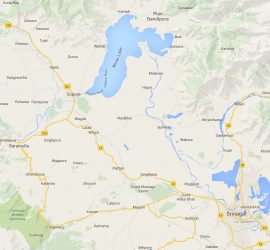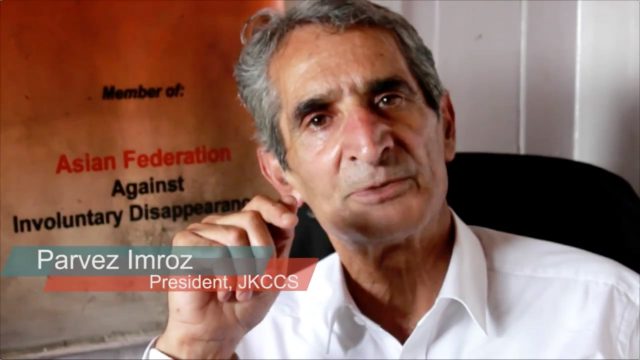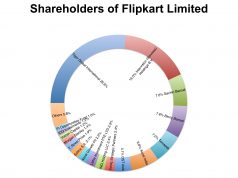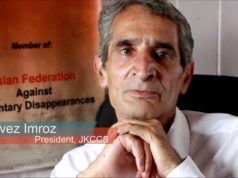Since the 12th of April, a 16-year old girl in Handwara, Kashmir has been at the center of a storm of unrest and violence that cost 5 people their lives. While is still not clear what happened to her, it is the allegation that she was sexually assaulted by a member of the Indian armed forces that sparked protests by locals and which appears to be the reason the local police have taken her into custody. From the 14th of April, she has been represented, at the request of her mother, by Srinagar based advocate Parvez Imroz. Imroz is also the president of the Jammu Kashmir Coalition of Civil Society (JKCCS), an organization that that documents, litigates and campaigns on human rights issues.
In Part 1 of the interview Imroz responds to questions about the current status of the Handwara minor (for a detailed timeline, see here) and what he hopes to accomplish. In Part 2 he discusses the wider context of the actions of the authorities in Kashmir.
Sushil Kambampati: How did you come to be involved in this case?
Parvez Imroz: On 14 April, two days after the incident involving the Handwara minor girl, we received word from a journalist from Handwara that her mother sought legal advise and representation from us. I, along with my team, met the mother on the following evening, and after discussions she asked us to represent her and her family in this case.
We met the minor girl herself on 17th April. But, the meeting with the minor girl was interrupted by the police on the 17th and it was only on the 21st April, nine days after the incident, when an uninterrupted meeting was possible with the minor girl [in the presence of her parents]. Of course, in this meeting as well the police interfered and did not allow my entire team to be present.
SK: What is your connection to the family?
PI: We had no contact with the family prior to this incident.
SK: How did the minor end up in police custody?
PI: A policeman at the location of the incident dragged the girl to the police station after witnessing the events there. She was taken to the police station in an attempt to immediately manage the situation i.e. control what she says. She expressly told the policeman who was dragging her to the police station that she wished to first go home [only a short distance away]. Since then she has been in police custody and control.
SK: Why do the police say they are holding her?
PI: The police have stated before the High Court – where a petition has been filed for her release from police custody – that the minor girl is only under their protection following her request for the same.
SK: Why do you think the authorities are holding her?
PI: The police and the army have already taken a side in this case i.e. against the minor girl. They have, in violation of law, taken a video statement of hers and made her make statements that are suitable to them. They are now nervous if she is allowed to be free, and out of their control and custody, she may make statements that are not convenient for them.
PI: The minor girl has informed us that she and her father were forced to sign on papers seeking protection. The police submission before the High Court is falsified by the manner in which the police have controlled the girl and family. They were not even allowed to attend the High Court hearing. Such manner of police “protection” is unheard of.

SK: Has she told you the details of the incident that set off these events in Handwara?
PI: We have had only limited opportunity to speak with the minor girl. We are presently focusing on her release from police custody as that is the most pressing issue. Details of the actual incident may be revealed following the girls release from custody and after she has had an opportunity to recuperate.
SK: Since being in custody, has she spoken to any one else besides the authorities and you, her lawyer?
PI: The minor girl has met with the Chairperson of the State Womens Commission, Ms. Nayeema Mehjoor, in person on 22 April 2016. Additionally, she has spoken to the Chairperson on the phone a few times. A written application written and signed by the minor girl was submitted to the Chairperson on 26 April 2016. On 27 April, the father too submitted an application. The focus of all these discussions/communications has been the police custody against her will.
SK: What do you want to see happen now?
PI: Our immediate demand is that she be released from police custody. We believe the only threat to her life comes from the armed forces and the police. She has to be released.
SK: What legal steps have you taken?
PI: We are before the High Court seeking her immediate release. The minor girl has also approached the Jammu and Kashmir State Women’s Commission and has requested that the Commission intervene to end the police custody or “protection” as they call it.
SK: What is going to happen next?
PI: The High Court is next scheduled to hear this case on 2 May 2016. We are also in touch with the Chairperson of the State Women’s Commission on what action the Commission may take.
SK: Beyond the release of the family members being held, has the family expressed a desire for any further action or redress from the authorities?
PI: The family wants action against those responsible for their unlawful custody and the making and circulation of the video of the minor girl. Other legal action will be discussed and considered once the minor girl is out of custody. An important part of the legal struggle is also that the minor girl has been able to fight against the slander campaign initiated against her by the police and the army. This is very much a fight for dignity as well as justice.
SK: What challenges have you faced from the authorities in this matter?
PI: Access to the minor girl – a basic right – has been denied and/or restricted. Even now, she is not allowed to move around freely. That has been the biggest challenge for us – to see a person only 16 years old be harassed and intimidated on a daily basis as we struggle for her rights before the court.
At various points as we sought to meet the mother of the minor girl or the minor girl herself the State has restricted us and effectively detained us on occasion as well. On 16 April 2016, as the High Court was hearing the petition on behalf of the mother of the minor girl, the mother came to our office in Srinagar to address the press. The police stormed into our office, detained our colleagues and the mother and kept the press out.
SK: How have the local people reacted to your involvement?
PI: We have been in touch with people in Handwara and received assistance and support. Importantly, because of our intervention, the perception of the minor girl and this case has changed in Handwara. But, still there is some confusion within a section of people.
SK: What has been the the reaction of the wider human rights community?
PI: There is deep concern in India and internationally from some quarters on the manner in which the State is treating this minor girl. Amnesty International have been in touch, been supportive and issued public statements. There are other groups such as the Coordination of Democratic Rights Organizations and individual human rights activists who have come out in support of the minor girl through statements, concern and a continuous monitoring of the situation.
Read Part 2 here.
Please like NewsPie's page on Facebook so that you get all our articles and others may find us.
Disclosure: A relative of the author is a member of the legal team representing the minor girl.







